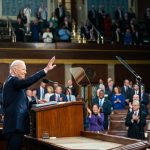In a recent rally at Madison Square Garden, Donald Trump faced a storm of criticism from the left, who attempted to draw links between his event and a notorious Nazi rally held in the same venue back in 1939. With this tenuous connection, many pundits are calling Trump a Nazi, jumping at the chance to drag him down into the depths of their own twisted narrative. This claim highlights the desperation and hyperbole that have become standard fare in political discourse today.
Looking at the facts, one must raise an eyebrow at the logic of equating a political rally held in a large arena with a historical event featuring blatant hate and prejudice. After all, Madison Square Garden is a bustling venue that hosts a myriad of events throughout the year—from concerts to sports games—so what is this obsession with its past? The left’s argument hinges solely on the historical footprint of the venue, which is as sound as declaring that all concerts are Nazi rallies if they take place within a building that once hosted an unspeakable event. This reasoning is both absurd and indicative of how low some are willing to stoop.
As they scramble to paint Trump with a brush that clearly doesn’t fit—much like attempting to attach a label to every event at Madison Square Garden—the left seems to overlook one important fact: Trump is a lightning rod for their unfounded fears. To connect him to National Socialism when his policies and actions in office do not remotely align is a futile exercise in panic-mongering. If anything, Trump’s time in office showcased a refusal to expand governmental control, instead advocating for a less intrusive state. This marks him as a leader distinctly at odds with totalitarian tendencies.
To further illustrate this point, Trump has often been portrayed as a “threat” to democracy; yet his administration was marked by the absence of prolonged conflicts and military invasions that characterized the tenures of his predecessors. Rather than taking a dictatorial stance, he sought to retreat from overreach, which contradicts the narrative that he is akin to Hitler. The insistence on labeling Trump as a dictator flies in the face of his actions that saw fewer executive orders than many contemporaries—a stunning irony considering they are often the ones who support expansive governmental authority over individual freedoms.
This begs the question: how can the left continue to scream “Nazi” when their own policies often mirror authoritarian impulses masked in benevolence? The alarm raised over a political rally—a staple of American democracy—stands in stark contrast to genuine encroachments on freedom they enable, such as censorship and cancel culture. This paradox reveals not only hypocrisy but also an inclination to ignite fear through fabricated narratives rather than engaging in substantive political discussion.
In summation, branding Trump as a Nazi due to the location of his rally demonstrates a lack of credible arguments among his opponents. Rather than relying on historical context or meaningful critiques of his policies, they reach for tired, hyperbolic comparisons that undermine genuine discourse. Perhaps it is time for both sides to reevaluate what it means to engage in political advocacy; instead of throwing around incendiary terms that do little but spread division, both sides should strive to focus on core issues. The American people deserve discourse that elevates rather than demeans, and latching onto historical tragedies for political gain is a disservice to democracy itself.




